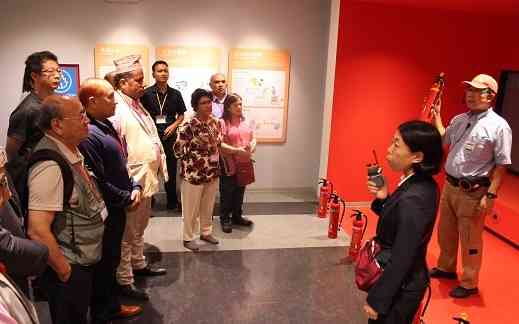CITYNET Disaster Cluster
The CITYNET Disaster Cluster (DC) was established to be a collaborative knowledge-sharing platform for DRR of CITYNET members across the Asia-Pacific region, led by CITYNET Yokohama Project Office.
Description
The CITYNET Disaster Cluster (DC) was established in 2005 after the 2004 Sumatra Earthquake and Indian Ocean Tsunami and the 2005 Kashmir earthquake. The goal of CITYNET’s Disaster Cluster is to mainstream DRR initiatives in cluster cities, this includes creating and managing a database of resources and contacts to foster collaborative projects. By creating an international city network that shares knowledge, cities can work together and tap into one another’s strengths and weaknesses.
Since its inception, the DC has implemented numerous DRR projects in coordination with several stakeholders, such as the reconstruction of a school in Pakistan, construction of community centers in Sri Lanka and Indonesia, support for DRR education in Nepal, community based adaptatin and resilience in the Philippines or the exchange of information on crisis management between members among several others.
Each year, CITYNET Yokohama Project Office (CYO) holds the Disaster Cluster Seminar (DCS), as a main event of the DC. The most recent DCS took place in Yokohama in early September 2019, and hosted over 60 participants from local governments, public sector organizations, private sector organizations, academia, and civil society organizations from across Asia-Pacific.
The DC assists member cities in reaching their Sendai Framework targets, specifically through target (f): Substantially enhance international cooperation to developing countries through adequate and sustainable support to complement their national actions for implementation of this Framework by 2030. As a project with the goal of increasing DRR knowledge throughout Asia-Pacific, the DC approaches this by facilitating connections between developing and developed countries.
All projects under the umbrella of "CITYNET Disaster Cluster" are listed here as deliverables. Any member of CITYNET can become a member of the Disaster Cluster to support and benefit from its programs.
Did the Sendai Framework change or contribute to changes in your activities/organization? If so, how?
When the Sendai Framework for Disaster Risk Reduction was adopted in 2015, the Disaster Cluster shifted towards completing projects that aligned with its priorities and targets. For the past two years, sessions at the Seminar have been focused on the Sendai Framework Priorities, with presenters detailing how their cities or organization achieve or strive to achieve each priority.
What led you to make this commitment/initiative?
What was your position before making this Voluntary Commitment / prior to the Sendai Framework?
When the Sendai Framework for Disaster Risk Reduction was adopted in 2015, the Disaster Cluster shifted towards completing projects that aligned with its priorities and targets. For example, the past two years, sessions at the Seminar have been focused on the Sendai Framework Priorities, with presenters detailing how their cities or organization achieve or strive to achieve each priority. Likewise, current and future projects are to be guided by Sendai priorities, targets and indicators.
Deliverables and Progress report
Deliverables
Deliverables are the end-products of the initiative/commitment, which can include issuance of publications or knowledge products, outcomes of workshops, training programs, videos, links, photographs, etc.
Through participation of Nepalese members in CITYNET Disaster Cluster Seminars, the need for a formal learning center was evident which led to the establishment of Nepal's first DRR learning center on December 1, 2019. This center is a public-private initiative and will cater not only to schools but also to train government officials, organisation representatives as well as the private sector participants. The center includes various exhibits including sharing of Japan's disaster prevention (BOSAI) practices, common hazards in Nepal and educational material developed in Nepal by Nepalese teachers.
This project is a result of discussions with Nepalese local governments and stakeholders who attended CITYNET Disaster Cluster seminars in the past and expressed the need for such facility in Nepal.
After being inspired by Yokohama City's Disaster Risk Learning Center at visits organized under the Disaster Cluster, the City of Makati is developing a disaster risk reduction learning center and academy, the Makati DRRM Academy. This initiative hopes to provide a platform for both formal and informal DRR learning, be a training and first-responders facility for both official and volunteer responders, and as a result integrate DRR knowledge into the community and institutions. This project is spearheaded by the Makati DRRM Office with facility establishment through Plus Arts and first responders' training through Yokohama City facilitated by CITYNET Yokohama Project Office.
This cooperation is the result of Makati visiting Japan's various DRR learning centers as a part of the annual CITYNET Disaster Cluster Seminars.
This is part of the city-to-city cooperation project between Makati City Government and the City of Yokohama to support personnel skill enhancement for the first responders. The training also falls under the Makati DRRM Academy project where a training facility combined with a learning center is being planned in cooperation with Plus Arts and CITYNET Yokohama Project Office.
Porgress report
CityNet Disaster Cluster is now preparing to organize its annual seminar. The 14th CityNet Disaster Cluster Seminar is scheduled to take place on November 10, 17 and 24, 2021.
Three different thematic sessions are planned as below:
Session 1: The Role of Cities in Urban Health Emergency Preparedness
Session 2: Making Cities Resilient 2030
Session 3: ICT and Data Driven DRR
Stakeholders of DRR from multi-sectors have committed to presenting and participating in the seminar. Further preparations are underway and the program details including speaker information will be available in mid-October. Registration for the webinar can be accessed through the link in the attached flyer.
Organizations and focal points
Implementing Organization(s)
Focal points
